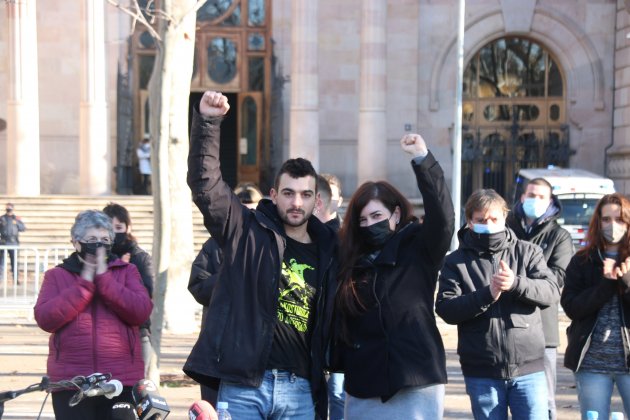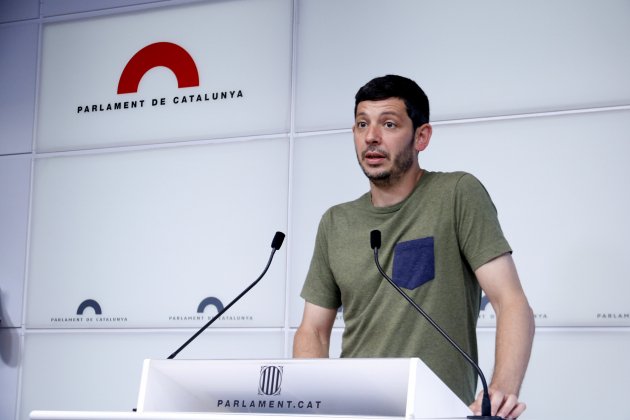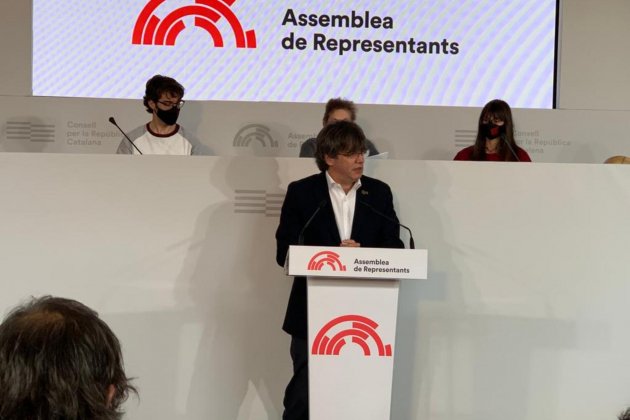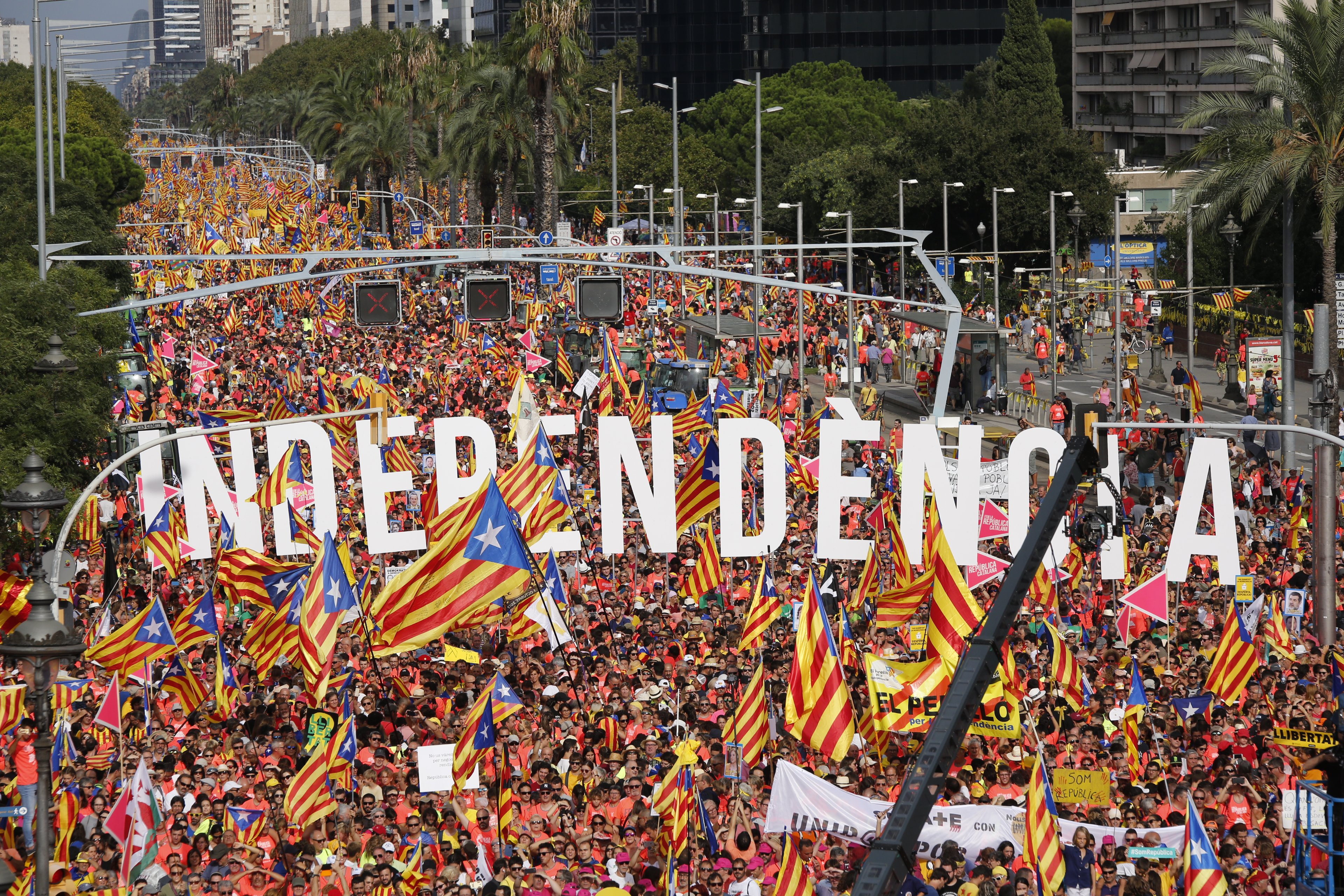The suspicions have been confirmed. An investigative judge at the principal Spanish court for serious criminal offences, the National Audience, carried out an investigation into the Catalan independence movement from the autumn of 2017 - after the holding of the 1st October 2017 referendum - until at least September 2019. It was a prospective investigation, that is, what is commonly known as a fishing expedition, an inquiry which casts a net widely to try and haul up some kind of criminal activity. And it included the monitoring of the telephones of 38 people from different Catalan associations and groups that had taken part in Catalonia's independence process. Members of the pro-independence left stand out among those spied on, such as CUP deputy Xavier Pellicer, who was at that time spokesperson for the Alerta Solidària legal aid group, an organization that defended the majority of those charged in pro-independence mobilizations, as reported by the digital weekly La Directa, on Monday.
ElNacional.cat has had access to the court documents relating to the two secret sub-investigations (14/2017 and 99/18) opened by judge Manuel García Castellón, of the court's central investigative chamber Number 6, which show that the Civil Guard bugged the phones of Catalan Mossos d'Esquadra police officers, firefighters, farmers, engineers and communicators who took part in mobilizations after 1st October, and also those who took part in the creation of the website for the Catalan exile body Council for the Republic, set up in March 2018 and led by former Catalan president Carles Puigdemont. The National Audience judge has, finally, handed over the information gathered in this investigation to the members of the so-called CDR groups (Committees for the Defence of the Republic) who were arrested in September 2019 and accused of terrorism offences, since the allegations against them originated in this investigation: they have not had this information until now, even though the investigation of their own case, now substantially watered down, is almost finished. The judge is still maintaining secrecy on one other sub-investigation - that relating to the Tsunami Democràtic protest platform - a fact that will no doubt imply that there was more telephone monitoring carried out in search of a crime, an action prohibited in criminal law.
The first investigation, into a possible offence of "glorification of terrorism" began in November 2017, when an Adif rail worker declared to the Civil Guard that "four acts of sabotage" had occurred along different sections of the Renfe rail lines in Catalonia, one of them in Cardedeu. The judge at that point allowed the monitoring of the mobile phones of two people, one of whom had worked in railway maintenance, and a Telegram account called "Tallem la Jonquera" was also monitored. The prosecution then asked the Civil Guard to change the crime to a terrorism offence, as it indicated that there was "an increasingly radicalized social movement that wanted to subvert the constitutional order". In this investigation, the Mossos police report on seven mannequins which appeared hanging from a motorway overbridge, with faces that were images of king Felipe VI and politician Albert Rivera among others, was also attached. The investigation into the first two people was closed, while in this hunt for seditious people on social media, the names of Tamara Carrasco and Adrià Carrasco then appeared, both of whom were subsequently arrested for alleged terrorism offences for the dissemination of an audio about mobilizations and the blocking of motorway tollgates, of which they were both - in the end and after long ordeals - completely acquitted. From high-profile terrorism charges which made headlines all over Spain, the accusations were gradually reduced to minor public disorder claims, which were then thrown out. "There is no evidence" said the Granollers judge who dismissed Adrià Carrasco's case in 2021.

The "Catalan CNI" and "Shields for the Republic"
Parallel to the street mobilizations, the Civil Guard informed the National Audience judge that it had discovered the nucleus of people who called themselves "the Catalan CNI" - in reference to the acronymn for Spain's National Intelligence Centre - who were in contact with CDR groups, and who also promoted the "Shields for the Republic" - a group initially created in 2018 to prevent violence at protests, an objective that the Spanish security body does not mention in its report to the court. The Civil Guard named a woman as the coordinator of this group, asserting that she said that "she had the whole country under control", without clarifying whether the purpose was simply to protest or to carry out actions to spread the Catalan independence cause. Along with her, they identified Lluís Escolà, a sergeant in the Mossos d'Esquadra police, who will be tried next year together with former Catalan minister Miquel Buch for allowing the policeman to travel with president Carles Puigdemont, allegedly through a contract from the Catalan interior ministry. Two more Mossos officers are also identified in this group, and the judge allowed their phones to be tapped too. In total, there were more than thirty people monitored. But no actions taken by the so-called Catalan CNI, nor evidence of its budget or any violent act is detailed in the report. Only protest mobilizations in the street, talks and meetings, including those of group called "Beers for the Republic". On this basis, the telephone was tapped of a leader of "Firefighters for the Republic"; an officer of the Barcelona city police, who with other colleagues and officers from other local police forces made up a group called Vent de Gregal (the name of Catalonia's north-easterly wind), even a spokesperson for a farmers' group. And in some cases, there were recorded conversations, and photos of a dinner with Joan Canadell, then the pro-independence president of the Chamber of Commerce Barcelona and current Junts MP, which are reproduced in the report. And there were also some people who took part in the Catalan National Assembly (ANC). In this bloc, also appearing is Roger Cumeras, who later became a CUP councillor in the town of Viladecans.
The Civil Guard affirms in one of the reports that "in the possible existence of a body called CNI Catalan, related to the Catalan regional and public administration, which in direct collaboration with some members of the self-styled Committees for Defence of the Republic (CDRs) have begun planning, through the use of violence and force to enter, occupy and temporarily defend the Parliament, with the aim of subverting the constitutional order and generating a crisis of serious and unpredictable political consequences and institutional, all this with the main purpose of achieving Catalonia's independence". None of this happened.
"Seditious" people, ready to act
"We are at an important turning point, not in the objectives that the Committees for the Defence of the Republic (CDR) want to achieve but in the procedures that they want to use for it", stated the Civil Guard in one of its reports to the judge in December 2017, warning that "they have knowledge of IT security" and that "they are in a recruitment phase, through which they could obtain an extensive network of IT experts to guarantee and protect their actions". And it concluded: "If this project progresses and is consolidated, we may find ourselves with a difficult challenge to investigate, due to the difficulty that digital observation of the communications carried out by the activists would entail, it being difficult to anticipate their actions (border control, airport blockade) and the identification of those responsible". And it specified that the activists used the messaging app Signal to avoid being intercepted. Two years later, at the time of the Supreme Court sentences against the pro-independence leaders, in October 2019, the major Tsunami Democràtic mobilizations would arrive, which did not subvert any constitutional order and whose leaders the Civil Guard is still investigating.
Out of all these alleged seditious individuals, the Civil Guard limited the investigation and follow-up to just nine CDR group members who were arrested on September 23rd, 2019, accused of wanting to barricade the Catalan Parliament if president Puigdemont arrived from abroad, or of devising a way of sabotaging electricity lines, but the explosives that it was claimed they had in their possession, were in the end only "precursors" - materials that could be used in their manufacture, according to the experts. They then arrested four more people, without imposing any precautionary measures. And they closed the case against one of them for health reasons. The prosecution accuses these people of belonging to a terrorist organization, and of the possession and manufacture of explosives.
The financing of Waterloo
The fishing expedition also went abroad. The journey was reconstructed of two computer scientists who travelled to Belgium to set up the website of the exile body, the Council for the Republic, based in Waterloo. In some of the conversations that are reported, there are those who express regrets that there was an impulse from the Council to dominate the mobilization groups initiated from Catalonia, as well as that their own work was not sufficiently recognized. Two companies were mentioned, CatGlobal ASBL and CATCIP, the latter being allegedly the one that collects donations and contributions for the members of the Council. And it cites four people as those responsible for the management body of the Council of the Republic's digital platform.
CUP parliamentarian spied on
With regard to members of left-wing pro-independence organizations, it was in July 2018 that judge Garcia Castellón allowed the Civil Guard to tap the phones of current CUP deputy Xavier Pellicer, then spokesperson for Alerta Solidària; Joan Terán, activist for Endavant, a group which is part of the CUP; and Josep Freixas, coordinator of Endavant in the Barcelona area. The Civil Guard justifies the tapping of their mobile phones "due to the radicalization" of the pro-independence movement. However, of the calls from Pellicer highlighted by the Spanish security body as important, one refers to "anti-repression sessions", a second conversation on September 10th, 2018, discusses the arrival of members from the Basque Country and Galicia to take part in Catalan National Day activities, and there is a third about a home eviction in Sabadell, about which he speaks with CUP councillors. There is no violent plan.

Software similar to Pegasus
Most of the 38 people investigated had their phones intercepted by court order. The National Audience judge also gave permission for a type of phone monitoring to be carried out on half of those investigated that required functions similar to those of Pegasus software. The CDR group activists accused of terrorism-related offences were monitored more closely, with geolocation beacons and microphones placed in their cars, as well as access to their computers and devices being obtained. And for at least four computer scientists with connections to Waterloo, the judge agreed, in June 2019, to the installation of software - the so-called SILC interception system - that allowed the examination of the content of their phones - remotely, electronically, and without the knowledge of the owner or user.


